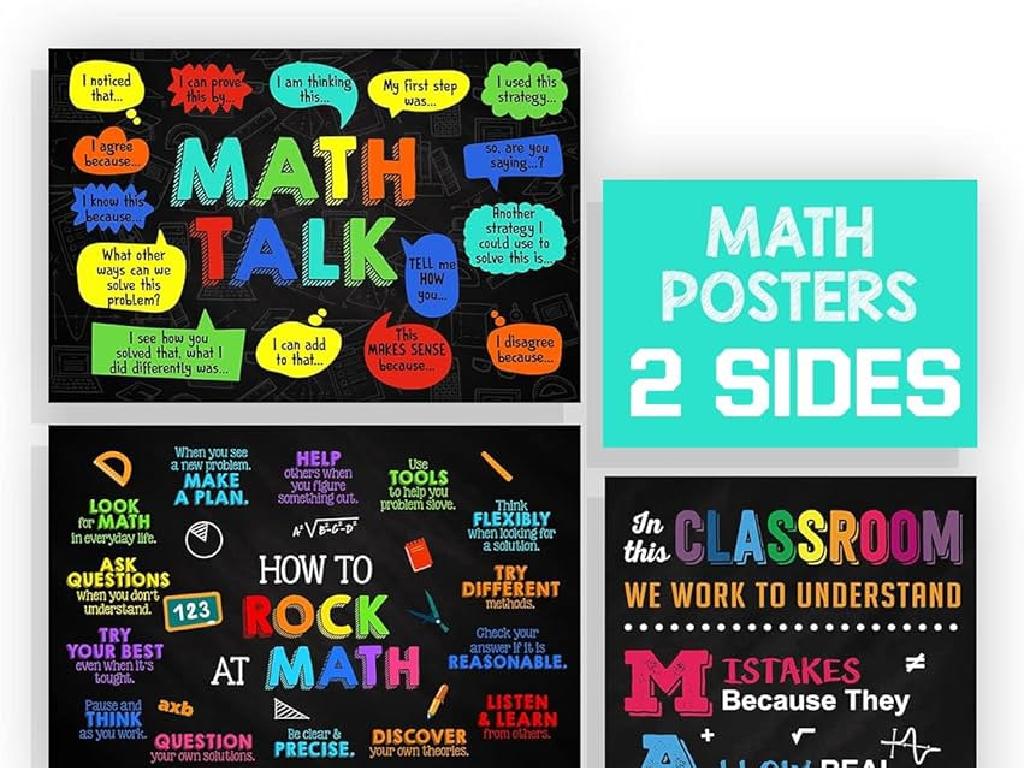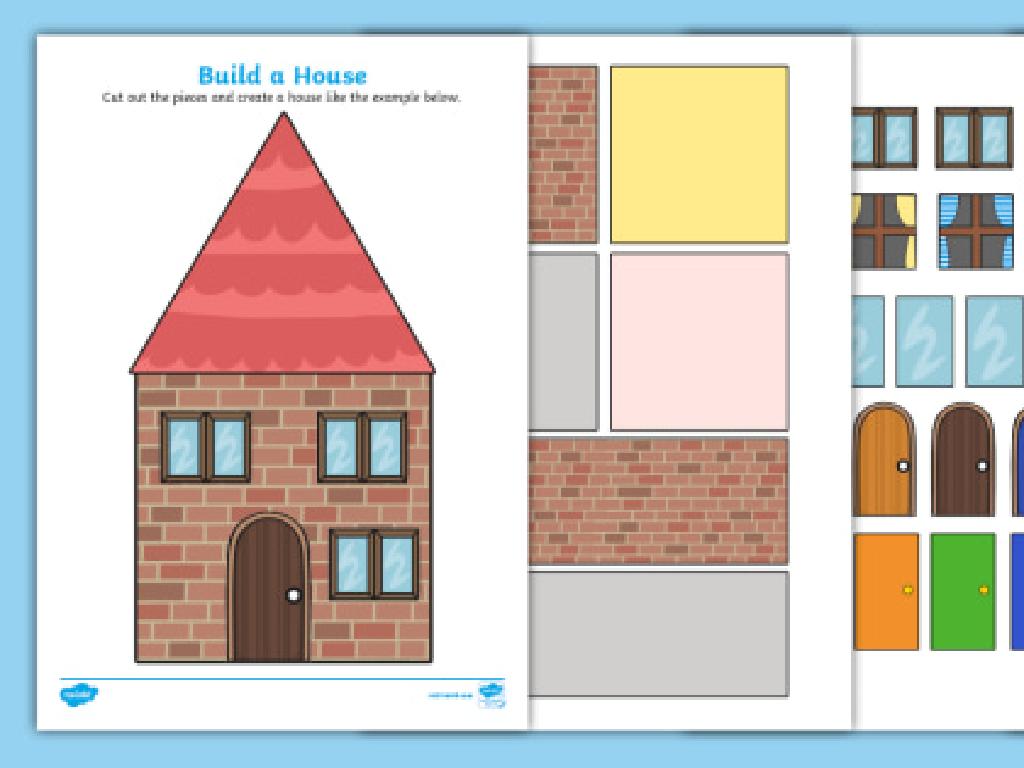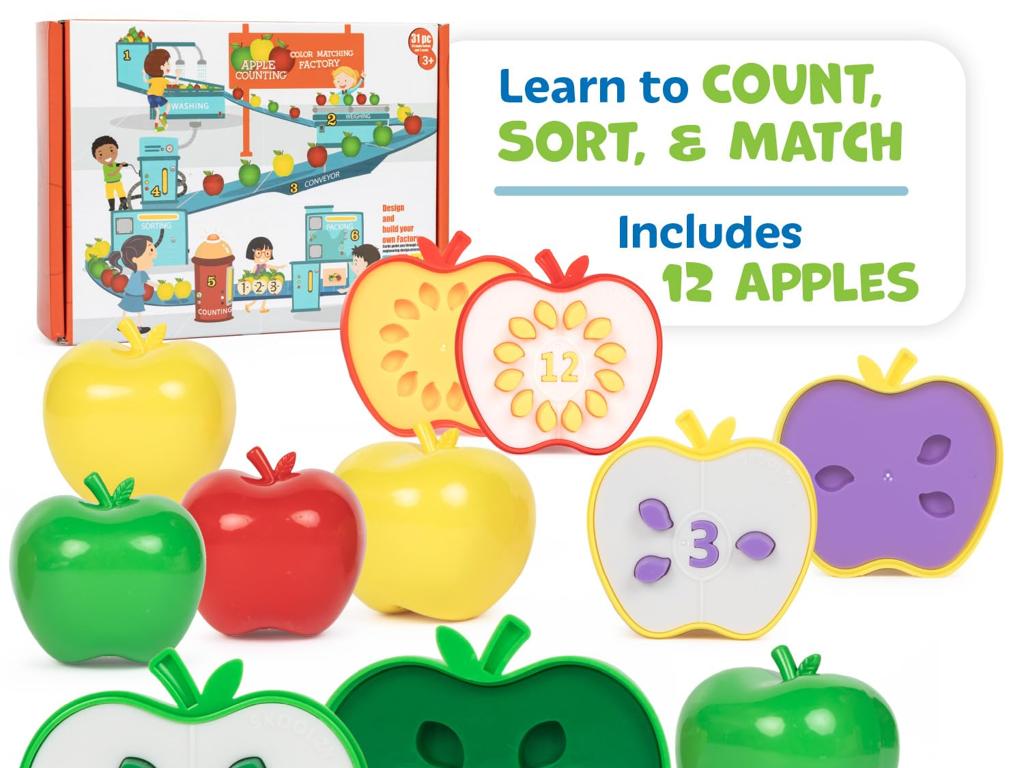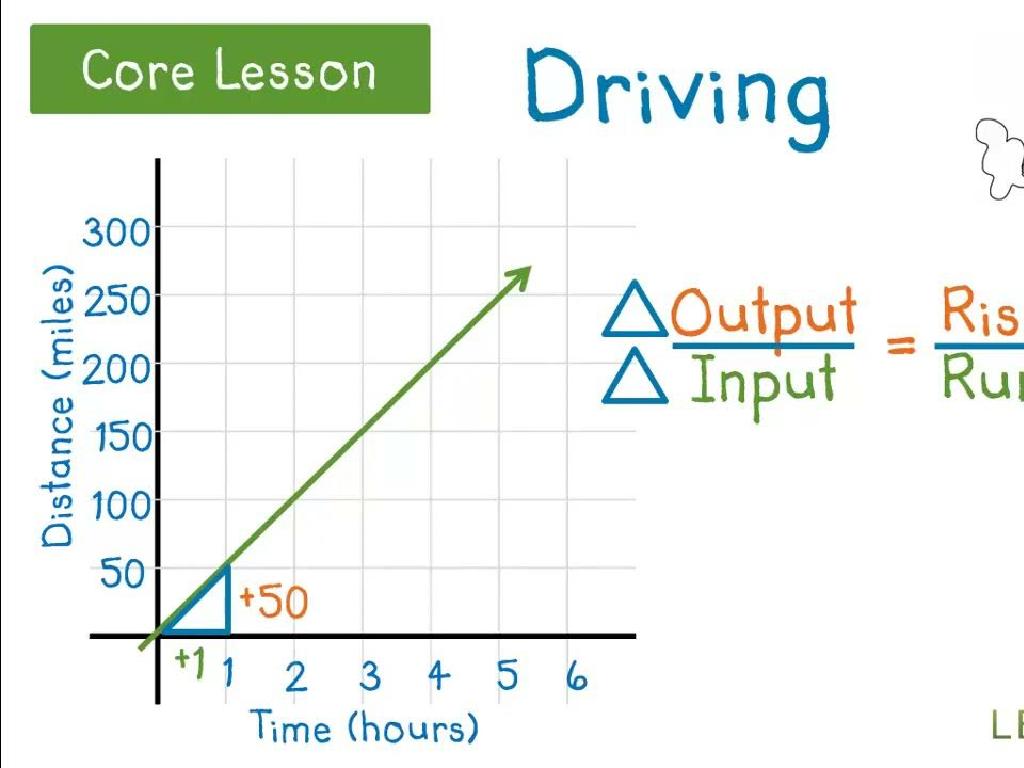What Does The Modal Verb Show?
Subject: Language arts
Grade: Fifth grade
Topic: Verb Types
Please LOG IN to download the presentation. Access is available to registered users only.
View More Content
Exploring Modal Verbs in Sentences
– What are modal verbs?
– Modal verbs express necessity or possibility, like ‘must’ or ‘might’.
– Types of modal verbs
– Common modals: can, could, may, might, must, shall, should, will, would.
– Modal verbs in action
– ‘She can swim’ shows ability. ‘You must go’ shows obligation.
– Why modal verbs matter
– They change the meaning of the main verb to show possibility, ability, permission, or obligation.
|
This slide introduces modal verbs as a key component of English grammar, which helps students understand how these verbs modify the meaning of main verbs to express different shades of necessity, possibility, permission, and ability. Start by defining modal verbs and then list the types, using examples to illustrate how they function in sentences. Emphasize the importance of modal verbs in conveying the speaker’s attitude towards the action. Encourage students to come up with their own sentences using different modal verbs to grasp their usage better.
Exploring Modal Verbs
– Verbs: Words of action or state
– A verb shows what something does or how it is.
– Verbs as sentence superheroes
– They make sentences exciting by showing action!
– Examples: run, think, be
– ‘Run’ for action, ‘think’ for mental action, ‘be’ for states of being.
– Modal verbs express possibility
– Words like ‘can’, ‘may’, ‘must’ show ability, permission, or obligation.
|
This slide introduces the concept of verbs to the students, emphasizing their role in expressing actions, occurrences, or states of being. It’s important to make the learning engaging by referring to verbs as the ‘action heroes’ of sentences, which will help students remember their function. Provide clear examples of verbs and introduce modal verbs as a special category that helps to express possibility, ability, permission, or obligation. Encourage students to think of verbs as the driving force in a sentence and to consider how modal verbs modify the meaning of the main verb. Use interactive activities where students can identify verbs and modal verbs in sentences.
Meet the Modal Verbs
– Modal verbs help the main verb
– Modals like ‘can’ change what the main verb means
– They express necessity or possibility
– ‘Must’ shows need, ‘might’ shows something is possible
– They show ability or permission
– ‘Can’ is for ability, ‘may’ for permission
– Common modals: can, could, may, might
– ‘Will’ for future, ‘should’ for advice
|
Modal verbs are auxiliary verbs that modify the main verb to express different shades of meaning such as ability, possibility, permission, or obligation. They are essential for students to understand as they provide nuances to sentences. For example, ‘can’ indicates ability, while ‘may’ suggests permission. It’s important to give students examples of sentences using these modals in context to help them grasp the concept. Have students practice by creating their own sentences using each modal verb to express different meanings.
Modal Verbs in Action
– Modal verbs don’t change form
– Always followed by base verb
– No ‘s’, ‘ed’, or ‘ing’ endings, just the verb as it is
– Example: She can swim
– ‘Can’ shows ability or possibility
– Example: He might eat
– ‘Might’ indicates a possibility
|
This slide introduces students to the concept of modal verbs, which are helpers that modify the main verb and express necessity, possibility, ability, or permission. Unlike regular verbs, modal verbs do not change form according to the subject and are always paired with the base form of the main verb without any additional endings like ‘s’, ‘ed’, or ‘ing’. Examples like ‘She can swim’ and ‘He might eat’ illustrate the use of modal verbs in sentences. Encourage students to think of modal verbs as ‘helpers’ to the main verb, providing more information about the action. Have students come up with their own sentences using different modal verbs to reinforce the concept.
Expressing Ability with Modal Verbs
– ‘Can’ shows current ability
– Use ‘can’ for things you are able to do now
– ‘Could’ indicates past ability
– Use ‘could’ for abilities you had before
– Examples help clarify usage
– ‘I can swim.’ or ‘He could play piano at 5.’
– Practice with personal examples
|
This slide focuses on the use of modal verbs ‘can’ and ‘could’ to express ability. ‘Can’ is used to talk about someone’s present ability to do something, while ‘could’ is used for abilities in the past. Provide clear examples to illustrate the difference, such as ‘I can solve the math problem’ for a current ability, and ‘She could read when she was three’ for an ability in the past. Encourage students to come up with their own examples of abilities they have now or had when they were younger to reinforce their understanding of these modal verbs.
Modal Verbs for Asking Permission
– ‘May’ for formal permission
– ‘May I go to the library?’ shows respect and formality.
– ‘Can’ for casual requests
– ‘Can I use your eraser?’ is informal and friendly.
– ‘Could’ for polite questions
– ‘Could I try your game?’ is courteous and considerate.
– Practice using modals
|
This slide introduces students to modal verbs used when asking for permission, which are ‘may’, ‘can’, and ‘could’. Explain that ‘may’ is used in formal situations or when being very polite. ‘Can’ is used for everyday, casual requests among friends. ‘Could’ is a more polite version of ‘can’ and is often used when asking for something that might be a bit of an imposition or to show respect. Encourage students to come up with their own examples and practice using these modals in different scenarios. This will help them understand the nuances of polite language and how to use it appropriately.
Expressing Possibility with Modal Verbs
– ‘Might’, ‘may’, and ‘could’ show possibility
– It might rain today means there’s a chance of rain.
– Use them when something is not certain
– You may find the book means the book could be there or not.
– They make sentences less definite
– Examples help us understand
– For instance, ‘I could go to the party’ suggests I’m unsure.
|
This slide introduces students to modal verbs that express possibility. Modal verbs like ‘might’, ‘may’, and ‘could’ are used when the speaker is not sure about something and wants to convey that uncertainty. They soften statements, making them less definite and more open to different outcomes. Provide examples to illustrate how these modals are used in everyday language. Encourage students to come up with their own sentences using ‘might’, ‘may’, and ‘could’ to describe situations that are possible but not certain. This will help them grasp the concept of expressing possibility through language.
Expressing Necessity or Obligation with Modal Verbs
– ‘Must’ shows strong necessity
– ‘Must’ is used for rules or urgent needs, like ‘You must wear a helmet’.
– ‘Have to’ expresses requirement
– ‘Have to’ is often for personal duties, e.g., ‘I have to do chores.’
– Examples in everyday life
– Practice using ‘must’ and ‘have to’
|
This slide focuses on how modal verbs ‘must’ and ‘have to’ are used to express necessity or obligation. ‘Must’ is typically used for strong necessities, often related to rules or laws, while ‘have to’ is more commonly used for personal or external requirements. Provide students with relatable examples such as stopping at a red light or completing homework to illustrate these concepts. Encourage students to think of other scenarios where ‘must’ and ‘have to’ would be appropriate. For practice, students can create sentences using both modal verbs to describe obligations in their own lives.
Making Predictions with Modal Verbs
– ‘Will’ for future predictions
– ‘Shall’ for future actions
– Examples of ‘will’ and ‘shall’
– ‘She will be a great artist’ shows a prediction. ‘We shall overcome the challenge’ expresses determination.
– Practice making predictions
|
This slide introduces the use of the modal verbs ‘will’ and ‘shall’ for making predictions about the future. Explain that ‘will’ is commonly used to predict future events that are likely to happen, while ‘shall’ is more formal and often used to express determination or a strong intention. Provide examples to illustrate how these modals are used in sentences. Encourage students to think of their own predictions using ‘will’ and ‘shall’ and share them with the class. This will help them understand the concept of making predictions and the appropriate use of these modal verbs in different contexts.
Class Activity: Modal Verb Charades
– Understand modal verbs through play
– Each student receives a sentence card
– The card will have a sentence with a blank where a modal verb should be
– Act out the sentence for classmates
– Use gestures and expressions, no speaking!
– Classmates guess the missing modal verb
– Think about what modal verb fits best in the acted sentence
|
This activity is designed to help students understand the use of modal verbs in a fun and interactive way. Modal verbs like ‘can’, ‘must’, ‘should’, etc., express necessity, possibility, or permission. By acting out sentences with missing modal verbs, students will engage with the material and each other, reinforcing their understanding of how modal verbs modify the meaning of a sentence. For the teacher: Prepare sentence cards in advance, ensuring a variety of modal verbs are represented. Encourage students to be creative with their actions. After each performance, facilitate a discussion on why the guessed modal verb is correct or incorrect, providing further clarification on usage.






